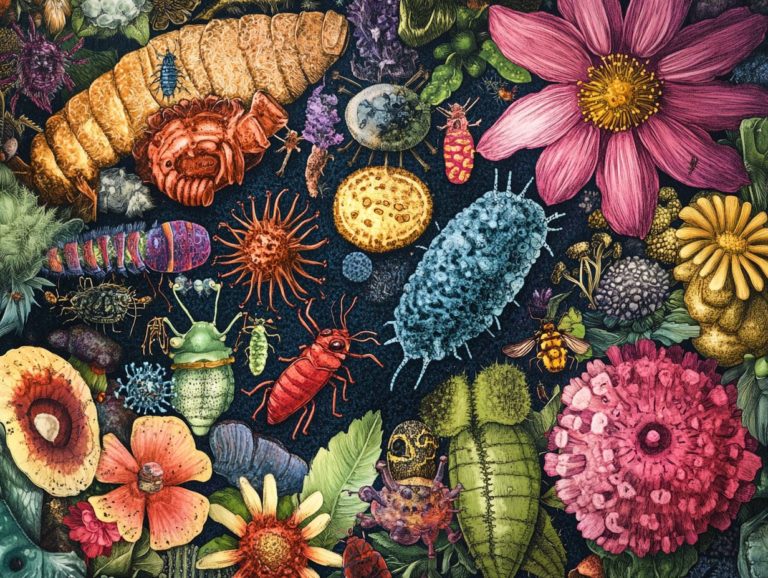5 Reasons to Choose Organic Pest Management
In a time when environmental awareness is gaining momentum, organic pest management stands out as a sustainable alternative to traditional methods.
This article delves into five compelling reasons for choosing organic pest management, emphasizing its advantages for the environment, your health, and the well-being of beneficial insect populations.
It provides a clear understanding of what organic pest management entails, the various methods employed, and tackles common misconceptions head-on.
Whether you’re a gardener, a farmer, or just someone intrigued by eco-friendly practices, this guide offers valuable insights that empower you to make informed decisions.
Contents
- Key Takeaways:
- 1. Safer for the Environment
- 2. Protects Beneficial Insects
- 3. Reduces Chemical Exposure
- 4. Better for Your Health
- 5. Long-Term Solution
- What Is Organic Pest Management and How Does It Work?
- What Are the Different Methods Used in Organic Pest Management?
- What Are the Benefits of Using Organic Pest Management?
- What Are the Common Misconceptions About Organic Pest Management?
- How Can Organic Pest Management Be Implemented in Different Settings?
- What Are the Potential Drawbacks of Organic Pest Management?
- Frequently Asked Questions
Key Takeaways:

- Choose organic pest management for a safer, more environmentally-friendly approach!
- Protect our food supply by safeguarding beneficial insects!
- Reduce chemical exposure for a healthier planet and family!
1. Safer for the Environment
Embracing organic pest control methods cultivates a healthier home and fosters a safer environment. By minimizing harmful chemicals, you help protect the variety of plants and animals and vital ecosystems.
When you choose eco-friendly solutions, you make sustainable decisions that safeguard both your family and the planet.
Consider using products like neem oil, which is derived from the seeds of the neem tree. This natural solution effectively repels a variety of pests while remaining beneficial to helpful insects.
Diatomaceous earth, made from fossilized algae, is another excellent non-toxic alternative that disrupts the life cycle of unwanted pests.
Implementing these natural solutions reduces chemical runoff that can contaminate local waterways and nurtures a community spirit focused on sustainability. As more individuals adopt these eco-friendly practices, you contribute to a collective effort that promotes a healthier environment and enhances the quality of life for everyone.
2. Protects Beneficial Insects
Using organic pest control methods allows you to eliminate harmful pests while safeguarding the beneficial insects essential for maintaining ecological balance in your organic garden.
These helpful allies, like ladybugs and bees, play crucial roles in pollination and natural pest regulation. Preserving these species is vital, as they contribute to healthier plant growth and improved yields.
Implement techniques like natural repellents, which are made from plant-based ingredients, or introduce biological controls such as beneficial nematodes to tackle soil-dwelling pests. These strategies foster a thriving ecosystem.
By choosing organic strategies, you keep unwanted insects away and protect these invaluable allies, creating a sustainable environment where plants and beneficial bugs can flourish together!
3. Reduces Chemical Exposure
Adopting organic pest management significantly reduces your exposure to chemicals, alleviating health risks linked to traditional pesticides and creating a safer environment for your children and pets.
This approach tackles toxicity and keeps your loved ones safe!
Utilizing organic pesticides and natural pest deterrents cultivates a healthier living space that harnesses nature’s defenses against pests.
Solutions like neem oil and diatomaceous earth effectively address infestations without compromising the well-being of your family.
This shift toward environmentally friendly alternatives highlights your commitment to sustainability and a safer future for generations to come.
4. Better for Your Health

Choosing organic pest control methods allows you to cultivate a healthier home. This significantly reduces the health risks associated with chemical fertilizers and pesticides.
By opting for organic products, you actively support mindful consumption. These practices enhance your well-being by creating a safer living environment and improving air quality by removing harmful chemicals that linger in your surroundings.
Embracing organic pest control gives you the power to minimize toxic residues that could affect both your physical health and the integrity of the environment. This commitment to a responsible lifestyle highlights the importance of wellness.
Ultimately, you’re contributing to the vibrancy of your community. The ripple effects of your choices lay the groundwork for a healthier planet, supporting biodiversity and fostering a more harmonious relationship with nature.
5. Long-Term Solution
Organic pest management transcends being a mere quick fix; it offers a sustainable, long-term solution to pest challenges. This is achieved through practices that emphasize prevention and the use of natural substances.
By placing a premium on ecological balance, these methods cultivate a healthier environment. They minimize reliance on chemical interventions that can harm beneficial insects and compromise soil quality.
Take composting, for instance. This enriching practice infuses the soil with nutrients, fostering a vibrant ecosystem where plants flourish and pests are naturally kept at bay.
Integrated pest management is a system that combines different methods for effective pest control. This holistic approach not only tackles existing pest problems but also champions biodiversity.
As a result, it creates a resilient agricultural landscape that can adapt and thrive over time. Ready to make a change? Let s explore these methods!
What Is Organic Pest Management and How Does It Work?
Organic pest management offers you a holistic approach that incorporates various strategies. This includes a system that combines different methods for effective pest control, maintaining the delicate ecological balance of your environment.
This method relies on natural substances and beneficial microorganisms, ensuring a more sustainable solution. Instead of merely reacting to pest issues, it emphasizes prevention and monitoring.
By tackling the root causes of problems, organic pest management encourages beneficial insects like ladybugs and lacewings to flourish. These insects naturally prey on harmful pests.
Certain microorganisms, such as specific bacteria and fungi, play a vital role in breaking down organic matter. They also compete with harmful pathogens, supporting healthier plant growth.
This intricate web nurtures a resilient ecosystem where natural pest control can thrive. By embracing this approach, you not only reduce the need for synthetic chemicals but also promote a more sustainable and harmonious environment.
What Are the Different Methods Used in Organic Pest Management?
Organic pest management offers a range of sophisticated methods. This includes biological controls, natural repellents, and DIY techniques, allowing you to tackle garden pests without relying on synthetic chemicals.
One of the most celebrated strategies is the use of garlic. Its potent aroma works wonders, effectively deterring a plethora of insects and pests from your garden.
Also, consider the vibrant marigold; it enhances your garden’s beauty and serves as a companion plant, repelling harmful nematodes and insects.
Diatomaceous earth is another valuable tool in your arsenal. This fine powder, derived from fossilized algae, acts as an effective barrier against soft-bodied insects by damaging their exoskeletons.
By integrating these methods, you can create a comprehensive approach to pest control. This fosters a healthy and vibrant garden while staying true to the principles of organic gardening.
What Are the Benefits of Using Organic Pest Management?

The advantages of embracing organic pest management reach far beyond mere pest control. They significantly enhance the overall health of your family and the environment through sustainable practices and eco-conscious decisions that champion ways to encourage pollinators and control pests in your garden.
By minimizing your reliance on synthetic pesticides, you not only protect your loved ones from harmful chemicals but also play a crucial role in preserving biodiversity in your garden and local ecosystems. This approach naturally encourages beneficial creatures, like ladybugs and birds, to flourish, resulting in a more harmonious environment.
Local markets reflect these values by selecting organically grown produce, thereby supporting farmers who prioritize health and sustainability. These thoughtful choices reinforce community resilience, paving the way for healthier living while cultivating a deeper connection to the world around you.
What Are the Common Misconceptions About Organic Pest Management?
Despite the rising enthusiasm for organic pest management, several misconceptions linger, particularly regarding its effectiveness compared to chemical pesticides and its role in pest management strategies.
You might think that organic methods are somehow inferior and can’t match the rapid action of synthetic options. Numerous studies show that organic pest management can be just as effective if not more so when it comes to promoting the long-term health of ecosystems.
For instance, farms employing organic techniques have reported significant reductions in pest populations without resorting to harmful chemicals. Research shows that these methods not only protect crops but also enhance biodiversity.
By prioritizing safety and sustainability, organic approaches emerge as a wise choice for modern agriculture.
How Can Organic Pest Management Be Implemented in Different Settings?
Implementing organic pest management can be customized to fit various environments, from urban homes to rural farms. This ensures a meaningful community impact while promoting a responsible lifestyle and healthier ecosystems.
Start today by establishing barrier gardens using companion planting, which means growing certain plants together to deter pests. Consider involving your neighbors in initiatives like community composting or shared gardening spaces. This approach not only boosts local biodiversity but also cultivates a sense of camaraderie among residents.
In rural areas, embrace crop rotation and enlist natural predators, such as ladybugs and lacewings, to tackle pests while keeping your crops safe from harmful chemicals. Engage local agricultural groups in knowledge-sharing sessions to enhance these practices, encouraging both small and large-scale farmers to collaborate and devise effective solutions tailored to their specific challenges.
What Are the Potential Drawbacks of Organic Pest Management?
While organic pest management presents a wealth of advantages, it s crucial to weigh the potential drawbacks, particularly when considering how organic pesticides perform during severe infestations compared to conventional pest control methods.
The time commitment needed for monitoring and applying organic solutions can feel overwhelming, whether you’re a novice or an experienced gardener. This often translates to countless hours spent researching effective strategies and meticulously tracking pest populations.
The inconsistency in effectiveness can be frustrating, especially if results fall short of your expectations. However, you can tackle these challenges by embracing holistic practices like crop rotation, companion planting, and regular inspections.
By diversifying your pest management strategies and nurturing healthy ecosystems, you can effectively minimize these drawbacks while amplifying the long-term benefits of your organic gardening efforts, which include positive choices for local markets.
Frequently Asked Questions

What is organic pest management?
Organic pest management is a method of controlling pests and insects using natural and organic materials instead of man-made chemicals. It focuses on prevention and uses least-toxic, biological methods to manage pest populations.
Why should I choose organic pest management?
There are several reasons to choose organic pest management:
- Reduced health risks: Organic pest management does not use harmful chemicals, making it safer for you, your family, and the environment.
- Effective pest control: Organic methods are proven to be just as effective as man-made chemicals in controlling pests.
- Sustainable: Organic pest management promotes a sustainable approach to pest control, reducing the impact on the environment.
- Preserves beneficial insects: Unlike man-made chemicals, organic methods do not harm beneficial insects, such as bees and ladybugs, which play important roles in our ecosystem.
- Long-term results: By focusing on prevention and using natural methods, organic pest management provides lasting solutions instead of just short-term fixes.
Are there any downsides to choosing organic pest management?
While organic pest management has many benefits, there are a few potential downsides to consider:
- It may require more time and effort. Organic methods may need more frequent applications and monitoring compared to man-made chemicals.
- It may be more expensive. The materials used in organic pest management can be pricier than man-made chemicals.
- It may take longer to see results. Organic methods typically take longer to control pest populations, as they focus on prevention rather than immediate eradication.
Is organic pest management safe for my plants?
Yes, organic pest management is safe for your plants. In fact, it can improve the health of your plants by promoting natural defense mechanisms and healthy soil. Unlike man-made chemicals, organic methods do not leave harmful residues on plants.
Can I use organic pest management indoors?
Yes, organic pest management can be used indoors. There are many organic methods that are safe and effective for controlling pests inside your home. These include using essential oils, diatomaceous earth, a natural powder made from tiny fossilized aquatic organisms, and traps.
Is organic pest management regulated?
Yes, organic pest management is regulated by the United States Department of Agriculture (USDA) National Organic Program. Products labeled as “organic” must meet strict standards set by the USDA and undergo regular inspections to ensure compliance.
Discover the exciting world of organic pest management! It s not just effective; it s also safe for your home and the planet! Act now to protect your plants with safe, organic solutions!






